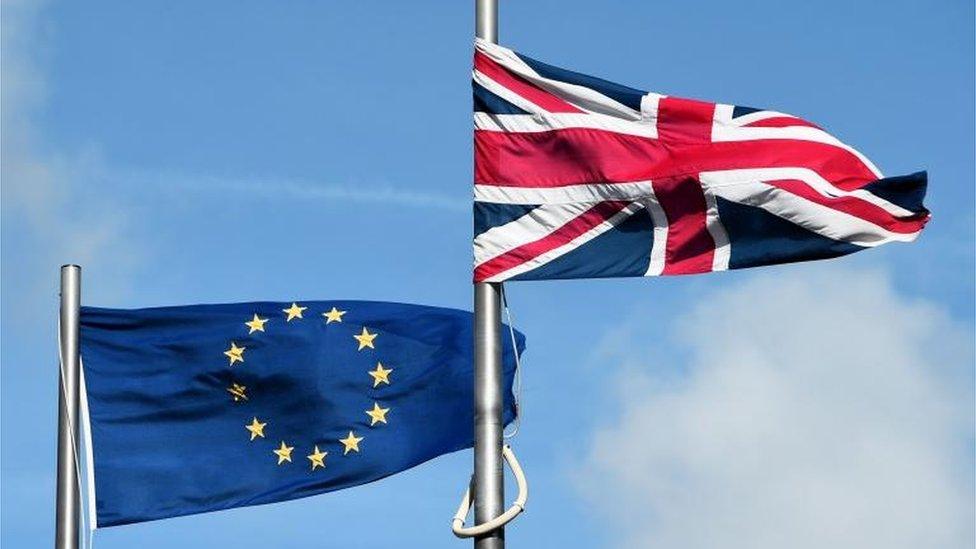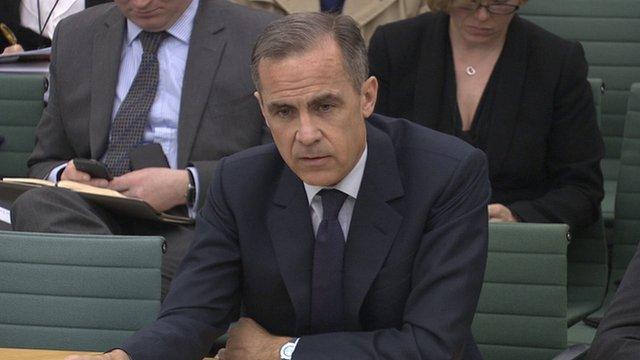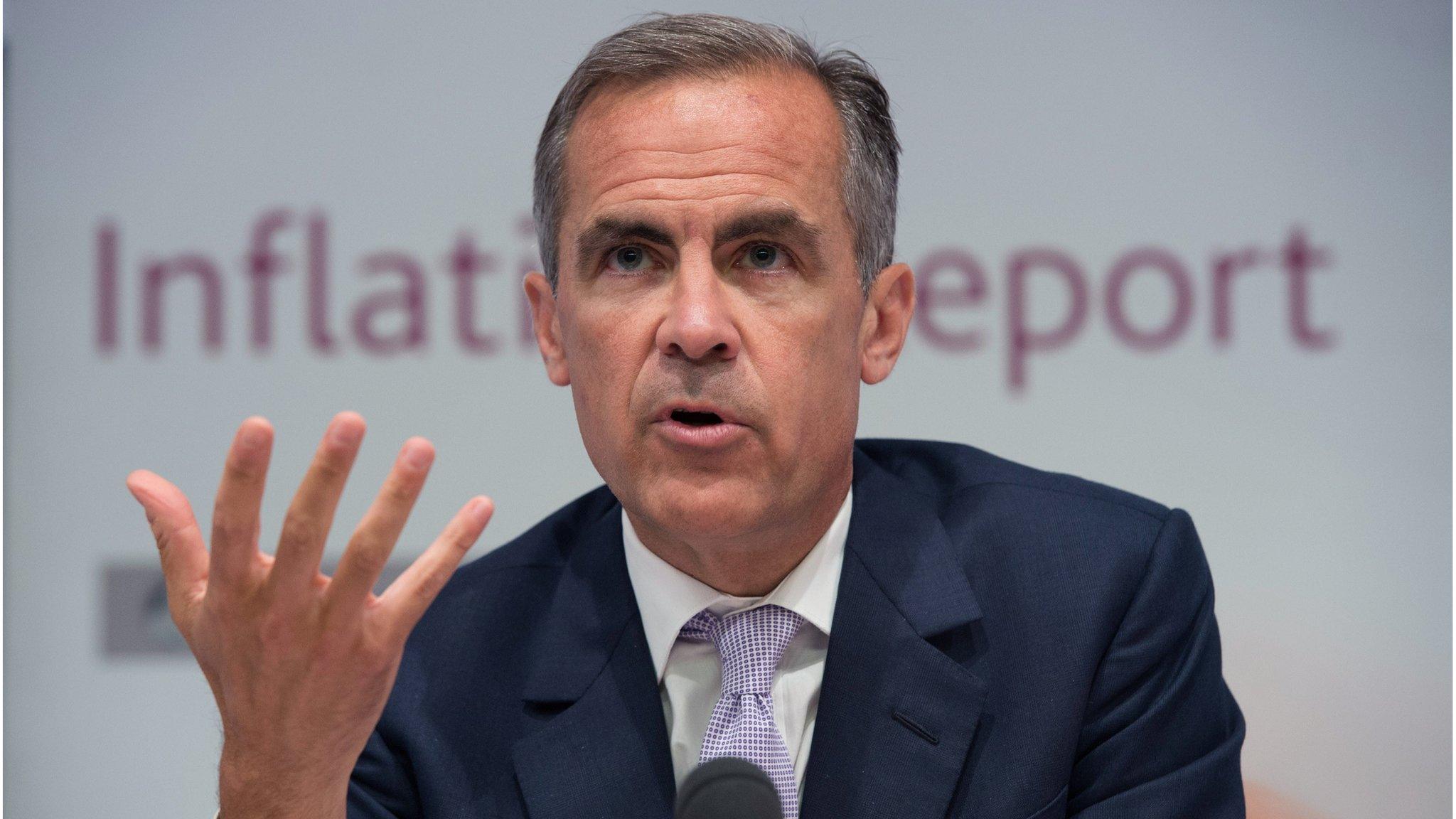Mark Carney: EU exit is 'biggest domestic risk'
- Published
Mark Carney has been accused of bias in the EU debate as Kamal Ahmad reports
The possibility of Britain leaving the EU is the "biggest domestic risk to financial stability", Bank of England governor Mark Carney has said.
He told the Treasury Committee that an exit vote could create economic uncertainty, although he added that remaining in the EU also carried risks.
Mr Carney emphasised the Bank was not taking sides in the EU referendum.
But Conservative MP Jacob Rees-Mogg accused him of making "pro-EU" comments.
The governor told the committee that an exit posed the biggest "domestic" risk in part because there could be uncertainty over such things as investment, household spending, and the impact on sterling.
Mr Carney said: "It is the biggest domestic risk to financial stability. I would say that in my judgement the global risks, including from China, are bigger than the domestic risks."
However, he told the committee that continued EU membership brought risks as well. "The principal risk - risks, I should say, because there are more than one - are associated with the unfinished business of European Monetary Union," Mr Carney said.
Separately, in a letter, external sent to Treasury Committee chairman Andrew Tyrie, Mr Carney said that Britain's membership of the EU had reinforced the "dynamism of the UK economy", and that the relationship had helped the UK to grow.
The governor also said in his letter that Prime Minister David Cameron's EU renegotiation deal, which comes into effect only if the UK votes to remain in the EU, "delivers a number of protections and additional tools that will help safeguard the Bank's ability to continue to achieve its statutory objectives".
The letter was released as Mr Carney appeared before the committee. In a sometimes fractious exchange with MPs, Mr Carney denied claims he was "pro-EU".
Mr Rees-Mogg said his comments were "beneath the dignity of the Bank".
Key figure
The referendum on whether Britain should remain in the European Union is to be held on Thursday, 23 June.
"We will not be making, and nothing we say should be interpreted as making, any recommendation with respect to that decision," Mr Carney said.
Mr Carney appeared in front of the cross-party Treasury Committee to discuss the economic and financial costs and benefits of the UK's EU membership.
Referring to a Bank of England report on the EU, Mr Carney concluded EU membership had "likely increased the dynamism of the UK economy and correspondingly its ability to grow without generating risks to the Bank's primary objectives of monetary and financial stability".

The deal with Europe over financial regulation was welcomed by Mr Carney
However, Mr Rees-Mogg said this could be attributed to reforms made under Margaret Thatcher.
"It is speculative and beneath the dignity of the Bank of England to be making speculative, pro-EU comments," Mr Rees-Mogg said.
The MP said that he was concerned the Bank was focused more on the positive aspects of EU membership than the negative, adding that it was guilty of "political partisanship" over Europe.
Mr Carney rejected Mr Rees-Mogg's statements as "wholly unfounded" and said: "With respect, what concerns me is your selective memory."
The governor said that he had not discussed what he was going to say on Tuesday with Mr Cameron. "I have not had conversations with the prime minister about what I might say about the European Union."

Analysis
By Kamal Ahmed, BBC economics editor
On short-term risk, the Bank is clear - the economic uncertainty created if Britain were to leave the EU could be significant. Though Mr Carney was careful to point out that global risks, such as the economic slowdown in China, could well be more significant.
As he considered the shark-infested waters he would face this morning, Mr Carney knew two things.
First, that the pro-remain camp would grab all his negative comments about Brexit and trumpet them as a victory for them.
And they will.
Second, that he was likely to be attacked by the pro-leave campaign for being deliberately partisan in his approach to the value or otherwise of the EU to the British economy.
And he was.
It was the only moment Mr Carney appeared to bridle, responding to Jacob Rees-Mogg's "beneath the Bank's dignity" attack with a testy "I cannot let that stand".
That's about as close as a central bank governor comes to blowing his top.


Mr Carney said risks from an EU exit included the Bank's ability to control inflation, a fall in the pound and banks moving abroad.
However, if Britain votes to leave the EU, Mr Carney said the Bank "will do everything in our power to discharge our responsibility to achieve monetary stability and financial stability".
He said that there were measures that the Bank of England could take in the short term to support the financial system but said he could not rule out the possibility that there could be issues with stability.
'Outside remit'
Commenting on the short-term impact of an EU exit, Mr Carney said: "There could be lower levels of activity because of the degree of uncertainty that could affect investment and household spending. Reasonable expectations during a period of uncertainty."
However, he said it would not be possible to say what the longer term impact of leaving the EU would be on Britain. "We are not forming a view because it's outside our remit," Mr Carney said.
Mr Carney was also questioned about the financial sector's reaction to an exit.
He said: "One would expect some activity to move, certainly there's a logic to that and there are views that have been expressed publicly and privately by a number of institutions that they would look at it, and I'd say a number of institutions are contingency planning for that possibility."
On Monday, the Bank of England pledged to offer extra funding to the financial market before and after the June vote, in case uncertainty put pressure on the banking system.
- Published8 March 2016
- Published8 March 2016

- Published30 December 2020

- Published26 May 2016

- Published21 October 2015
